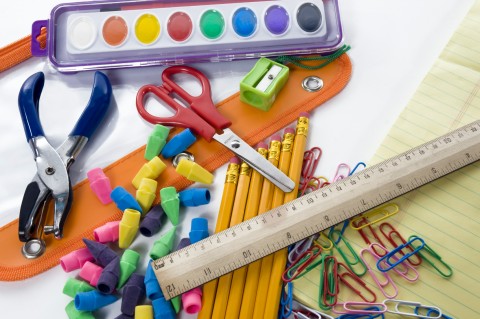
Are you planning on studying or teaching in France? Do you know the most common classroom phrases in French for students or teachers alike? Whether you’re about to join a university as a foreign student or to teach your native language as a teacher in a French school, you will have to learn how to communicate in the classroom.
If you’re a student, not only will you need to learn how to address your teachers, but also to understand their instructions. And vice versa if you’re in the teacher’s shoes! You will also need to learn some basic vocabulary, such as school subjects and supplies, as well as infrastructure.
In this guide, you’ll find everything you need to know as a teacher or a student, from common phrases to vocabulary, instructions, and a list of school subjects. It will teach you how to ask questions or give instructions and allow you to focus solely on the topic at hand rather than struggling with the common classroom interactions. Get your pencil case ready, and let’s jump straight into it!

Levez la main avant de répondre. (“Raise your hand before answering.”)
 Table of Contents
Table of Contents
- School Vocabulary
- Teacher’s Phrases
- Student’s Phrases
- Subjects’ List
- Tests Instructions
- Le mot de la fin
1. School Vocabulary
Before we get to the common french phrases, let’s get some basic school vocabulary. To get your way around the schoolyard or the campus, you will need to know about the infrastructure as well as the stationaries.
1- Educational Infrastructures
| Une salle de classe | Classroom |
| Un bâtiment | Building |
| Un amphithéâtre | Amphitheater |
| La cantine | Canteen |
| Le restaurant universitaire | University canteen |
| La cafétéria | Cafeteria |
| Une salle d’examen | Exam room |
| Le secrétariat | Secretariat |
| La salle des professeurs | Teachers’ room |
| La bibliothèque | Library |
2- School Supplies
| Un cahier | Notebook |
| Un classeur | Binder |
| Une feuille | Sheet of paper |
| Un livre | Book |
| Un stylo | Pen |
| Un crayon | Pencil |
| Une trousse | Pencil case |
| Une gomme | Eraser |
| Un cartable | Schoolbag |
| Un sac à dos | Backpack |
| Une calculatrice, Une calculette | Calculator |
| Des ciseaux | Scissors |
| Une règle | Ruler |
| Un taille-crayon | Pencil sharpener |
- ➜ For more school essentials and classroom vocabulary, be sure to explore our free vocabulary lists of French words with audio recordings. It’s free on FrenchPod101.

Des fournitures scolaires (“School supplies”)
2. Teacher’s Phrases
Whether you’re a student or a teacher in a French class, this section is for you! As a teacher, you need to know how to address your class, and as a student, you’d better understand what the teacher is saying. Let’s see some of the most common French teacher’s phrases.
1- Instructions
| Aujourd’hui, nous allons apprendre la conjugaison. (“Today we are going to learn conjugation.”) |
| Ouvrez votre livre à la page 12. (“Open your book on page 12.”) |
| Prenez une feuille de papier. (“Take a sheet of paper.”) |
| Levez la main si vous avez la réponse. (“Raise your hand if you have the answer.”) |
| Ecoutez et répétez après moi. (“Listen and repeat after me.”) |
| Regardez l’image à l’écran / Regardez l’image au tableau. (“Look at the picture on the screen.” / “Look at the picture on the board.”) |
| Écrivez cette phrase. (“Write this sentence.”) |
| Épelez ce mot. (“Spell this word.”) |
| Faites une phrase avec le mot “demain”. (“Make a sentence with the word “tomorrow.””) |
| Comment dit-on “tomorrow” en français ? (“How do you say “tomorrow” in French?”) |
| Travaillez deux par deux. (“Work in pairs.”) |
| Nous allons former de petits groupes. (“We will form small groups.”) |
2- Questions
| Vous comprenez cette phrase ? (“Do you understand this sentence?”) |
| Qu’est-ce que ça veut dire ? (“What does that mean?”) |
| Qui peut répondre à cette question ? (“Who can answer this question?”) |
| Quelle est la bonne réponse ? (“What is the correct answer?”) |
| Qui veut lire à voix haute ? (“Who wants to read aloud?”) |
3- Discipline
| Asseyez-vous. (“Take a seat.”) |
| Un peu de silence. (“Silence, please.”) |
| Faites attention. (“Be careful.”) |
| Taisez-vous au fond. (“Shut up in the back.”) |
- ➜ Would you like to live on a French campus? Never get lost with our free vocabulary list on School campus, complete with examples and recordings, on FrenchPod101.

Travailler en petits groupes (“To work in small groups”)
3. Student’s Phrases
France is renowned for its high education and affordable studies, making it one of the 5 most popular destinations for foreign students. For more information on the various programs, financing options, and campus sites, the website Campus France is the most official online resource you’ll find.
1- Talking About Teachers
In primary school, school teachers are referred to as:
- [Male] Un maître (Literally: “Master”)
- [Female] Une maîtresse (Literally: “Mistress”)
In University and High school, they are called Professeur (“Professor”)
There is also a short casual version: Prof
You can use these words when talking about teachers:
- La maîtresse est absente jusqu’à demain. (“The teacher is away until tomorrow.”)
- Je suis professeur à l’université de la Sorbonne. (“I am a professor at the Sorbonne University.”)
- Mon prof d’anglais a un accent Écossais. (“My English teacher has a Scottish accent.”)
2- Addressing Teachers
At every level, unless told otherwise, students address their teachers using the words:
- [Male] Monsieur (“Sir”)
- [Female] Madame (“Madam”)
Here are a few examples:
- Madame, j’ai une question. (“Madam, I have a question.”)
- Monsieur, est-ce que je peux utiliser un crayon ? (“Sir, can I use a pencil?”)
As a teacher, whether it’s your colleagues or your students, you can simply call them by their names.
3- I have a Question
What is the most important information to convey during a class? When you don’t understand something. Whenever it happens, you shouldn’t wait until it magically clicks. It’s best to be proactive and talk about it right away.
Similarly, you will probably have some questions along the way, and being able to articulate them clearly is a valuable skill.
| Je ne comprends pas. (“I don’t understand.”) |
| Je ne comprends pas la terminaison de ce mot. (“I don’t understand the ending of this word.”) |
| J’ai du mal à conjuguer ce verbe. (“I have trouble conjugating this verb.”) |
| Vous pouvez répéter s’il vous plaît ? (“Could you repeat that please?”) |
| Vous pouvez répéter plus lentement ? (“Can you repeat slower?”) |
| Je ne sais pas dire ça. (“I don’t know how to say that.”) |
| Comment ça se prononce ? (“How do you pronounce it?”) |
| Quelle page ? (“What page?”) |
4- I have a Problem
We’re spending so much time in the classroom that we’re bound to face some trouble. It is not much of a problem to have an unforeseen event or an accident, as long as you know how to explain it.
| J’ai oublié mon livre. (“I forgot my book.”) |
| Je n’ai pas de stylo. (“I don’t have a pen.”) |
| J’ai perdu mon cahier. (“I lost my notebook.”) |
| J’ai un problème. (“I have a problem.”) |
| Est-ce que je peux emprunter une gomme ? (“Can I borrow an eraser?”) |
| J’ai besoin d’un peu plus de temps. (“I need a little more time.”) |
| J’ai presque terminé ! (“I’m almost done!”) |
| Je peux aller aux toilettes ? (“Can I go to the bathroom?”) |
| Je m’excuse pour le retard. (“I apologize for the delay.”) |
| Je ne pourrai pas venir au prochain cours. (“I won’t be able to come to the next class.”) |
| Je n’ai pas fait mes exercices. (“I didn’t do my exercises.”) |
| J’ai oublié mes devoirs (“I forgot my homework.”) |
| Le chat a vomi sur mes devoirs et mon cartable a pris feu. (“The cat threw up on my homework and my schoolbag caught fire.”) |
- ➜ Are you one to break the rules? Feeling too cool for school? Check out our Top 15 phrases for bad students, on FrenchPod101.

Je ne comprends rien. (“I don’t understand anything.”)
4. Subjects’ List
You probably already know how to talk about what you’re studying or teaching, but whenever you’re chatting with your fellow students or teachers, a variety of other subject matters may come up.
| Les mathématiques | Math |
| La biologie | Biology |
| La chimie | Chemistry |
| L’informatique | Computing |
| La physique | Physics |
| L’art | Art |
| Le dessin | Drawing |
| Le français | French |
| L’anglais | English |
| L’allemand | German |
| La littérature | Literature |
| La philosophie | Philosophy |
| Le latin | Latin |
| La poésie | Poetry |
| L’éducation civique | Civics |
| L’économie | Economy |
| La politique | Politics |
| La comptabilité | Accounting |
| La psychologie | Psychology |
| La sociologie | Sociology |
| L’anthropologie | Anthropology |
| L’histoire | History |
| La géographie | Geography |
| Le commerce | Business |
| La musique | Music |
| Le solfège | Music theory |
| L’EPS (éducation physique et sportive) | Physical education (PE) |
And here’s how to talk about these subjects:
| Je vais en cours d’histoire. (“I’m going to history class.”) |
| Ma matière préférée est la philo. (“My favorite subject is philosophy.”) |
| J’ai de bonnes notes en biologie. (“I have good grades in biology.”) |
| Passer un examen (“To take a test”) |
| Je dois réviser le dernier cours de solfège. (“I need to review the last music theory class.”) |
- ➜ To practice your pronunciation, be sure to stop by our free vocabulary list on School Subjects, with recorded words and example phrases, on FrenchPod101.

Un cours de physique (“A physics course”)
5. Tests Instructions
When you pass an exam in a foreign country, the last thing you want is to be stressed about the instructions and simple interactions, instead of focusing on the content of the exam itself. Even if you’re well prepared, you have to understand how the exam will take place and exactly what you have to do.
1- Basic Vocabulary
| Passer un examen (“To take an exam”) Réussir un examen (“To pass an exam”) Rater un examen (“To fail an exam”) |
| You should not confuse Passer un examen with “To pass an exam” These 2 sentences are false friends. In this sentence, the French verb passer means “To take” and has no implication on the outcome. “To pass” would translate to Réussir (“To succeed”) |
| Passer un examen (“To take a test”) |
| Un examen oral / Un oral (“Oral exam”) |
| Un diplôme (“Degree”) |
| Une salle d’examen (“Exam room”) |
| Un surveillant d’examen (“Test supervisor”) |
| Un formulaire (“A form”) |
2- Instructions
| Lisez le texte (“Read the text”) |
| Lisez les phrases (“Read the sentences”) |
| Cochez la bonne réponse (“Check the right answer”) |
| Cochez les cases (“Check the boxes”) |
| Remplissez les blancs (“Fill in the blanks”) |
| Complétez ces phrases (“Complete these sentences”) |
| Mettez ces images dans le bon ordre (“Put these images in the right order”) |
| Soulignez la bonne réponse (“Underline the correct answer”) |
| Barrez les mauvaises réponses (“Cross out the wrong answers”) |
| Écoutez l’exemple (“Listen to the example”) |
| Décrivez cette image (“Describe this image”) |
| Écrivez environ 200 mots (“Write about 200 words”) |
| Résumez ce texte en 100 mots (“Summarize this text in 100 words”) |
| Remplissez la grille ci-dessous (“Fill in the grid below”) |

Il révise pour son examen. (“He is studying for his exam.”)
6. Le mot de la fin
In this guide, you have learned all the most common classroom words and phrases in French, for students and teachers alike. From school vocabulary to test instructions, how to address your teacher or to conduct your class, this guide should provide you with a solid foundation for your daily life in a French school.
Did we forget any important French classroom phrases, or some specific topic you’d like to read about? Make sure to share with your fellow students in the comments below!
To go deeper into the topic, you can explore FrenchPod101, as it has plenty of Free resources for you to practice your grammar and learn new words. The Vocabulary lists are also a great way to revise the words and learn their pronunciation.
Remember that you can also use our premium service, MyTeacher, to get personal 1-on-1 coaching and have your own private teacher to practice with classroom words and more.
Along with assignments, personalized exercises, and recording audio samples just for you, your teacher will review your work and help improve your pronunciation. Happy learning on FrenchPod101!
About the Author: Born and bred in the rainy north of France, Cyril Danon has been bouncing off various jobs before he left everything behind to wander around the wonders of the World. Now, after quenching his wanderlust for the last few years, he’s eager to share his passion for languages.










